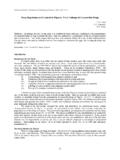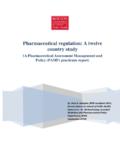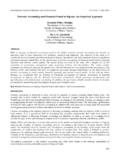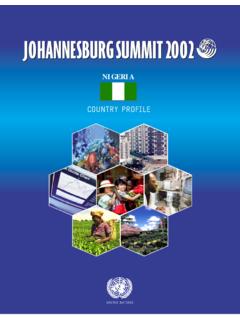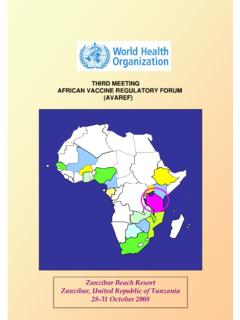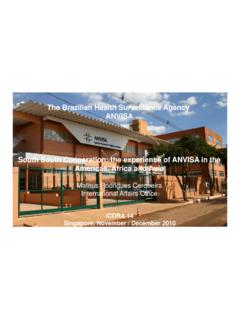Transcription of An Assessment of Fertilizer Quality Regulation in …
1 nigeria Strategy Support Program (NSSP) Report 09 October 2010 An Assessment of Fertilizer Quality Regulation in nigeria Saweda Liverpool-Tasie International Food Policy Research Institute Abba A. Auchan Federal Ministry of Agricultural and Rural Development Afua B. Banful International Food Policy Research Institute IFPRI-ABUJA International Food Policy Research Institute c/o International Center for Soil Fertility and Agriculture Development Plot 1413 Ogbagi Street Off Oro-Ago Crescent Cadastral Zone 11, Garki, Abuja nigeria E-mail: IFPRI HEADQUARTERS International Food Policy Research Institute 2033 K Street NW Washington, DC 20006-1002 USA Tel. +1-202-862-5600 Fax +1-202-467-4439 E-mail NSSP Report 9 ii THE nigeria STRATEGY SUPPORT PROGRAM (NSSP) WORKING PAPERS ABOUT NSSP The nigeria Strategy Support Program (NSSP) of the International Food Policy Research Institute (IFPRI) aims to strengthen evidence-based policymaking in nigeria in the areas of rural and agricultural development.
2 In collaboration with the Federal Ministry of Agriculture and Water Resources, NSSP supports the implementation of nigeria s national development plans by strengthening agricultural-sector policies and strategies through: Enhanced knowledge, information, data, and tools for the analysis, design, and implementation of pro-poor, gender-sensitive, and environmentally sustainable agricultural and rural development polices and strategies in nigeria ; Strengthened capacity for government agencies, research institutions, and other stakeholders to carry out and use applied research that directly informs agricultural and rural polices and strategies; and Improved communication linkages and consultations between policymakers, policy analysts, and policy beneficiaries on agricultural and rural development policy issues. ABOUT THESE REPORTS The nigeria Strategy Support Program (NSSP) reports either contain preliminary results or support ongoing research.
3 They are circulated in order to stimulate discussion and critical comment. This publication was made possible through support provided by the Maximizing Agricultural Revenue and Key Enterprises in Targeted Sites (MARKETS) program, financed by Agency for International Development and implemented by Chemonics under contract number 620-C-00-05-00077-00. The opinions expressed in this publication are those of the author(s) and do not necessarily reflect the views of IFPRI, Chemonics, and/or the Agency for International Development. iii Table of Contents Abstract .. iv Abbreviations .. v Introduction .. 1 Overview of Institutions in Fertilizer Quality Regulation in nigeria .. 2 Fertilizer Quality Challenges in nigeria .. 4 Data and Methodology .. 5 Discussion .. 6 Who Is Responsible for Fertilizer Quality Regulation in nigeria ? .. 6 Fertilizer Quality Issues, their Nature and Sources .. 7 Activities of Fertilizer Regulatory Agencies.
4 9 Perspective of State Representatives .. 9 Perspective of Local Producers .. 9 Consequences of Producing and Trading Poor Quality Fertilizer and the Way 10 Summary and Conclusions .. 11 References .. 13 Annex I .. 14 Annex 2: .. 21 List of Tables Table 1: Survey respondents by region .. 6 Table 2: Problems with locally produced Fertilizer versus Fertilizer from other sources .. 7 Table 2: Continuation .. 8 Table 3. Product Quality challenges across Nigerian states .. 8 iv Abstract Despite a multifaceted Fertilizer Quality regulatory process with numerous and diverse participants, Fertilizer Quality remains a challenge in nigeria . Fake, adulterated, and misbranded fertilizers , as well as underweight Fertilizer bags are prevalent in the Nigerian market (FGN 2006). Not only have Fertilizer Quality issues been identified as a major constraint to Fertilizer use in nigeria , but farmers have indicated interest in higher Fertilizer use, despite the cost, if they were assured of improved Quality (Nagy and Edun 2002; Chude 2006).
5 Though currently absent, the importance of access to affordable, timely, and good Quality Fertilizer for increased agricultural productivity and food security in nigeria is clear. Consequently, this study examines Fertilizer Quality Regulation in nigeria . Using primary data collected from state officials in charge of Fertilizer and from Fertilizer production and blending plants, we explore the extent to which the Nigerian Fertilizer sector is effectively regulated to ensure the Quality of fertilizers delivered to farmers. The study found that the nature and sources of Fertilizer Quality challenges in nigeria are well known, cutting across all Fertilizer products in the market. Though there are bodies mandated to monitor Fertilizer Quality , the regulatory system for Fertilizer Quality in nigeria is not clearly defined and well developed. The study results indicate that addressing Fertilizer Quality challenges in nigeria is imperative requiring a holistic approach to the Regulation of Fertilizer production and distribution in the country.
6 A clear assignment of monitoring and regulatory roles is needed at every stage of Fertilizer production (blending) and distribution with a broader reach to peri-urban and rural markets. v Abbreviations ABU Ahmadu Bello University ADP Agricultural Development Program AISD Agriculture Input Services Department FCT Federal Capital Territory FFD Federal Fertilizer Department FFPD Federal Fertilizer Procurement and Distribution Division FGN Federal Government of nigeria FMSP Federal Market Stabilization Program FMWAR Federal Ministry of Agriculture and Water Resources FSFC Federal Superphosphate Fertilizer Company IFDC International Center for Soil Fertility and Development MANCAP Mandatory Conformity Assessment Program MSDS Material Safety Data Sheets NAFDAC National Food and Drugs Administration and Control NAFRAC National Agency for Fertilizer Regulation and Control NFDC National Fertilizer Development Centre (NFDC)
7 NFTC National Fertilizer Technical Committee NIS Nigerian Industrial Standards NPK Nitrogen-Phosphorous-Potassium SDI state direct imports SMA States Ministries of Agriculture SON Standards Organization of nigeria SONCAP Standards Organization of nigeria Conformity Assessment Program SONCO Local SON Country Offices SSP Superphosphate Fertilizer 1 Introduction A typical regulatory framework for Fertilizer , usually backed by legislation, generally makes provision for compulsory registration of Fertilizer manufacturers, importers, and dealers; specification of all fertilizers manufactured/imported and sold in the country; guidelines on manufacture of Fertilizer mixtures, packing and labeling on the Fertilizer bags; appointment of enforcement agencies; setting up of Quality control laboratories; prohibition on manufacture/import and sale of non-standard/spurious/adulterated fertilizers ; and standardization of qualifications of all Fertilizer manufacturers, importers, and dealers in the country.
8 The framework also has provision for cancellation of authorization/registration certificates of dealers and mixture manufacturers as well as the proposed punishment for offenders as applicable. The types of Fertilizer commonly produced and used in nigeria include urea, Nitrogen- Phosphorous-Potassium (NPK), and Superphosphate (SSP). The most common NPK blends are: 15-15-15, 20-10-10, 12-12-17+2Mg0, and 25-10-10. NPK fertilizers are further formulated to be site and crop specific. In order to ensure effective procurement and distribution of Fertilizer , the federal government, at various times, has put in place guidelines for the production, procurement, and distribution of the product. The government seeks to ensure national self sufficiency through local Fertilizer production, supplemented by importation to ensure adequate and timely Fertilizer supply to all farmers. The government also offers a subsidy on the market price of Fertilizer so as to make Fertilizer affordable to smallholder farmers (Ayoola et al.)
9 2002). During 1976-1995, the main statute in force was the National Fertilizer Board Act of 1977 which provided for the establishment of, a corporate body to be charged with the responsibility for purchasing and distributing Fertilizer to State Governments at such subsidized prices as may be determined by the Federal Government. In addition, the Fertilizer (Control) Decree of 1992 has provisions to punish any person who, without permission of the appropriate authority, deals in, sells or distributes Fertilizer in a place not designated for the purpose of sale or distribution of Fertilizer . A significant weakness in the existing framework is the lack of legislation on the required qualifications for manufacturers, blenders, and importers of Fertilizer or on the procedures for enforcing these qualifications. The Federal Government regulates the Fertilizer sector through the National Fertilizer Technical Committee (NFTC) which acts as an advisory body of experts for constantly reviewing and recommending formulations to farmers, as well as new products based on the results of agronomic trials.
10 In this regard, the National Fertilizer Development Centre (NFDC) was established to undertake laboratory analysis of Fertilizer products and formulations. Reform of the regulatory system for Fertilizer is presently under consideration in view of the limited attention paid by existing mandate regulatory bodies such as the Standards Organization of nigeria (SON) and the National Food and Drugs Administration and Control (NAFDAC). This study describes the nature and mechanisms of Fertilizer Quality Regulation in nigeria in an effort to understand how farmer access to good Quality Fertilizer can be improved. Using primary data collected from state officials in charge of Fertilizer and from Fertilizer production and blending plants, the study explores the extent to which the Nigerian Fertilizer sector is effectively regulated to ensure the Quality of fertilizers delivered to farmers. This report is organized as follows. Section 2 provides an overview of institutions in Fertilizer Quality Regulation in nigeria while section 3 describes the major Fertilizer Quality challenges in 2 the country.

